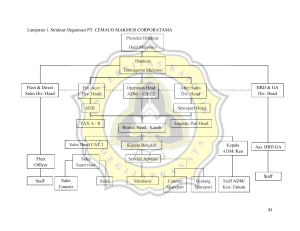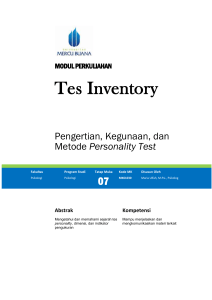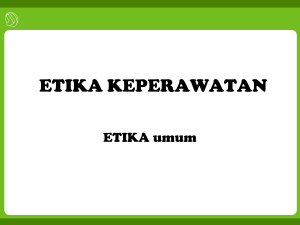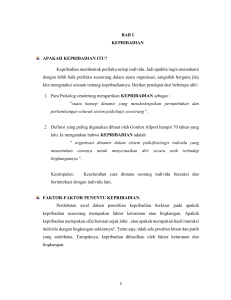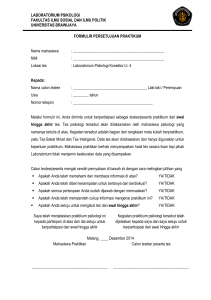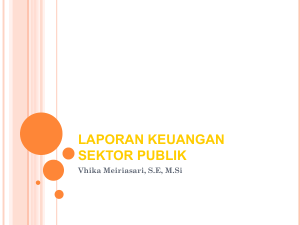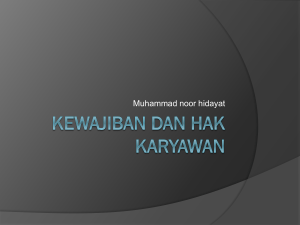Tes Proyeksi
advertisement
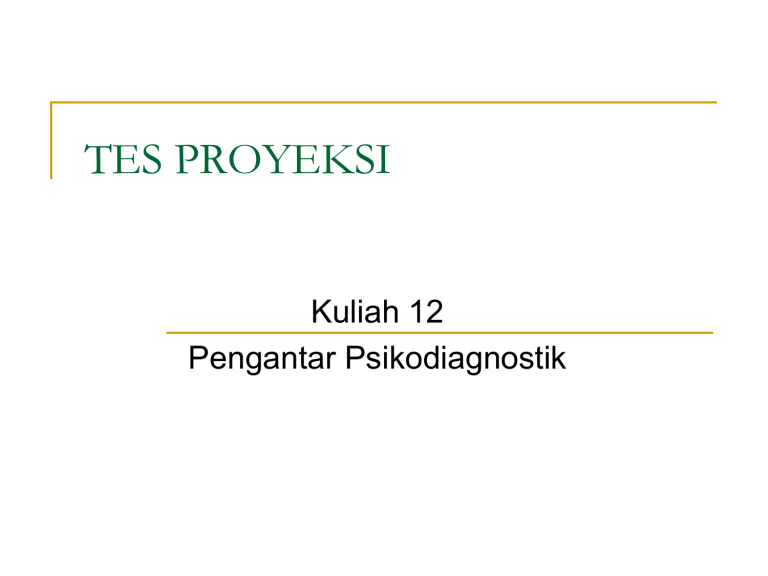
TES PROYEKSI Kuliah 12 Pengantar Psikodiagnostik Projective Tests Biasanya tes proyektif mengevaluasi keinginan2, emosi, pengalaman, memori, dan imajinasi yg tdk disadari oleh individu Asumsi dari tes ini adalah : dgn diberikan stimulus yang ambigu/tidak terstruktur maka ia dapat transfer/memproyeksikan konflik2 yang tidak ia sadari. Contoh : Ro, TAT, DAM, BAUM, HTP Sejarah Lahirnya Tes Proyektif “Projective tests were born in the spirit of rebellion against normative data and through attempts by personality researchers to break down the study of personality into the study of specific traits of varying strengths” Psikometri Tes Proyektif Validitas dan reliabilitas awalnya tidak ada Interpretasi berdasarkan teori kepribadian dan pengalaman klinis psikolog Namun bukan berarti kemudian tidak dilakukan penelitian untuk tes-tes tersebut Akhirnya dengan menggabungkan pengalaman klinis dalam intepretasi tes terbentuklah interpretasi yang sifatnya normrefereced. Sifat-sifat Tes Proyeksi 1. 2. 3. 4. Tugasnya tidak berstruktur sehingga memungkinkan respon yang tidak terbatas dgn tugas yang tdk bstruktur maka akan terungkap hal2 yg tdk disadari oleh individu Testee tdk mengetahui apa yang akan diukur dalam mengikuti tes sehingga kemungkinan untuk faking good berkurang Tes proyeksi dapat menarik hal2 yang tidak terlihat dan tidak disadari Kemampuan berbahasa kurang dibutuhkan dalam mengerjakan tes menggambar Bentuk-bentuk Tes Proyeksi 1. 2. 3. 4. 5. Teknik ink blot = tinta Teknik pictorial = gambar Verbal = asosiasi kata, sentence completion Autobiography = diary Teknik performance = HTP, DAM, BAUM The Inkblot Techniques Rorschach Test Diperkenalkan pertama kali oleh psychiatrist dari Swiss, Hermann Rorschach. Terdiri dari 10 inkblots. Tes ini dikritik pd 1950’ dan 1960’s karena norma dan prosedurnya tdk terstandardisasi. Rorschach Test (cont.) Dapat mendeteksi gangguan berpikir, seperti schizophrenia atau manik depresi. Namun, biasanya dicek lagi dgn tes yang lebih obyektif. Tes ini tidak dibekali untuk deteksi kondisi2 psikiatrik. Tes ini tidak valid untuk deteksi sexual abuse in children, violence, impulsiveness, criminal behavior. The Rorschach Inkblot Test Ambiguous stimuli Person is asked to report what they see No clear image, so the things you see must be “projected” from inside yourself Sample Rorschach Card Pictorial Techniques Thematic Apperception Test Klien diminta untuk bercerita mengenai gambar2 ambigius Sayangnya, administrasi TAT tdk terstandardisasi dan interpretasi sangat tergantung dengan jam terbang dan intuisi psikolog. Thematic Apperception Test (cont.) Reliabilitasnya lemah dan validitasnya dipertanyakan Tes ini tidak dapat membedakan indv2 yang psikotis/depresi dgn indv normal Individu diminta untuk bercerita ttg gambar yang ada di kartu. Performance Techniques Draw-a-Person Tes ini mengharuskan testee untuk menggambar. Interpretasinya berdasarkan karakteristik gambar yang dibuat oleh testee. Psikolog terkadang menegakkan diagnosa terlalu berlebihan bila testee tidak dapat menggambar pdhl mungkin saja memang tidak dapat menggambar 1. 2. 3. 4. 5. 6. 7. Dalam memproduksi gambar orang yang dapat dilihat adalah impuls-impuls yang tidak disadari, kecemasan, konflik, dan kompesasi yang muncul dalam diri testee. Yang dilihat dari gambar orang adalah: Waktu yang dibutuhkan u menyelesaikan gambar Penempatan gambar 8. Ekspresi wajah Ukuran gambar 9. Posture Tekanan pensil 10. Baju Simetri gambar 11. Kesan keseluruhan Kualitas garis Shading, hapusan House-Tree-Person (HTP) Florence Goodenough presented her Measurement of Intelligence by Drawings in 1926. The focus was on the human figure drawing and the purpose was to initially derive a measure of I.Q. House menggambarkan figur ibu Tree menggambarkan figur ayah Person menggambarkan testee Intrepertasi HTP 1. 2. 3. 4. 5. Kesan Umum gambar Proporsi gambar rumah, orang, pohon gambarnya sebanding atau tidak Posisi gambar letak gambar apakah seperti rangkaian Komposisi gambar letka gambar apakah menunjukkan kesatuan Penyelesaian gambar gambar yang menjadi fokus penyelesaian House-Tree-Person (HTP) Combining an ease of administration with a maximum of projective potential, the HTP allows the clinician to gather information which might not otherwise be available in a structured, verbal interview. Drawing, a non-verbal activity, is often viewed as a means to communicate deeper, pre-verbal aspects of the personality. House-Tree-Person (HTP) In common with other projective measures of personality (e.g. the Rorschach, or TAT), the HTP provides a structured context for the projection of unconscious material. Like a specific ink blot or TAT card, the client is always presented with blank paper (or a standardized drawing form) and standard instructions as to what is to be drawn (the house, the tree, the person). House-Tree-Person (HTP) Unlike the Rorschach or TAT, the HTP presents a maximum of ambiguity for the client. Whereas the Rorschach and TAT present a stimulus card which does not change over time, the HTP presents the client with a completely blank field onto which they are asked to draw and project. Every client will draw a house, but every house will differ. The result is a collection of projective material organized around standard themes. The HTP can claim a great deal of freedom from stimulus bias. House-Tree-Person (HTP) The analysis of the HTP drawing set may then take two paths. The first involves an analysis of the content and the quality of the drawings. A post-drawing inquiry is used to explore the depth of the material behind the projections. House-Tree-Person (HTP) Useful lines of inquiry can be uncovered and developed for use in future therapeutic interviews. The important point about this part of the HTP analysis is its subjectivity. The set of drawings done by a client will have relevance to that person alone. The HTP used as an adjunct to a therapeutic interview allows the clinician access to deeper material as brought forth by the process of projective drawing. House-Tree-Person (HTP) The second path of an HTP analysis extends beyond the original use of the technique as an intrasubjective analysis of the individual. HTP drawing sets have also been researched and compared intersubjectively as well. In other words, what kind of subject will draw which kind of features in common or in difference? Kesimpulan Penggunaan tes proyeksi ini harus di lingkungan yang terbatas krn sifat dari tes ini. Critiques 1. - 2. - 3. - - Rapport dan Penerapannya Alat tes proyeksi biasanya sebagai “alat” untuk mencairkan hubungan ant psikolog dan klien = entertaining Faking Klien yang mengerjakan tes proyeksi jarang dapat melakukan faking bila dibandingkan mengerjakan self-inventory Examiner dan varibel situasi Instruksi yang kurang terstandardisasi membuat si examiner timbul perasaan kurang PD dan dapat mempengaruhi kinerja ketika pelaksanaan tes Skoringnya kurang objektif. 4. - - 5. - Norma Normanya kurang representatif krn populasi yang dijadikan sample tidak jelas Krn tidak ada norma yang objektif, penilaian sangat tergantung pd jam terbang psikolog dalam praktek klinisnya Reliabilitas Scorer reliability Tdk standar nilailanya. Frequency of projective tests by clinical psychologists 90 80 70 60 50 40 30 20 10 0 frequently or always Rorschach TAT Human Figure Drawings occasionally
